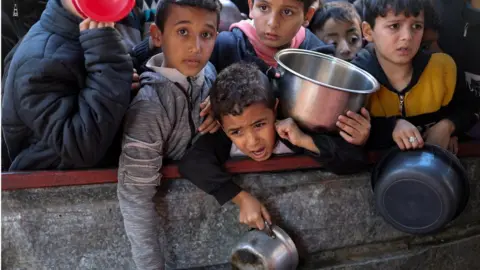Netanyahu insists on Rafah offensive as warnings mount
 Reuters
ReutersIsrael is facing growing international warnings over its planned offensive in Rafah - the city in southern Gaza crammed with Palestinian refugees.
Prime Minister Benjamin Netanyahu said the Israeli military will go ahead with its planned ground offensive, insisting an evacuation plan is being prepared.
UK Foreign Secretary David Cameron said "over half of Gaza's population are sheltering in the area".
Saudi Arabia warned of "very serious repercussions" if Rafah was stormed.
Dutch FM Hanke Bruins Slot also warned of "many civilian casualties", while the United Nations has said there is nowhere safe to go for the more than a million Palestinians who have already fled to Rafah.
Gaza's Hamas rulers said there could be "tens of thousands" of casualties, warning on Sunday that any operation would also undermine talks about a possible release of Israeli hostages held in the strip.
Israel launched its operations in the Palestinian enclave after more than 1,200 people were killed in southern Israel on 7 October by Hamas gunmen, who also took about 240 people hostage.
On Sunday the Hamas-run health ministry in Gaza said 112 more Palestinians had been killed by the Israeli military over the previous day, bringing the overall death toll to more than 28,100 and more than 67,500 injured.
Many Gazans have ended up in Rafah having been forced to flee their homes elsewhere at least once.
Saturday's warnings came a day after Israeli Prime Minister Benjamin Netanyahu ordered his military to prepare to evacuate civilians from the city ahead of an expanded offensive against Hamas.
The prime minister also rejected Hamas's latest proposed ceasefire terms.
In an interview with US broadcaster ABC News aired on Sunday, Mr Netanyahu said "victory is in reach" and the Israeli military were "going to get the remaining Hamas terrorist battalions in Rafah".
He also said Israel would "provide safe passage" for civilians in the southern city.
When pressed about where they should go, Mr Netanyahu suggested there were "plenty" of areas "that we've cleared north of Rafah" and insisted officials were "working out a detailed plan".
"Those who say that under no circumstances should we enter Rafah are basically saying, 'Lose the war. Keep Hamas there,'" he added.
The US has already warned Israel that an invasion of Rafah as part of its assault on Gaza would be a "disaster", while the EU and the UN both expressed their own concerns.
Aid groups say it is not possible to evacuate everyone from the city on the border with Egypt.
UN humanitarian co-ordinator Jamie McGoldrick, who has just been to Gaza to assess the situation, told the BBC's Barbara Plett Usher that people in Rafah would have "nowhere to go" if Israeli troops launched their offensive.
"The safe areas that were declared are no longer safe. And if these people have to move - where can they move? We are really fearful of the horrific nature of where we are could only ever get worse," he said.
Some 1.5 million Palestinians are believed to be in Rafah, seeking refuge from Israeli combat operations in the rest of the Gaza Strip. Most of them are living in tents.
In a social media post, Mr Cameron said he was "deeply concerned about the prospect of a military offensive in Rafah.
"The priority must be an immediate pause in the fighting to get aid in and hostages out, then progress towards a sustainable, permanent ceasefire."
Meanwhile, Ms Bruins Slot described the situation in Rafah as "very worrying".
"Many civilians in Gaza have fled south. Hard to see how large-scale military operations in such a densely populated area would not lead to many civilian casualties and a bigger humanitarian catastrophe. This is unjustifiable," she added.
Also on Saturday, the Saudi foreign ministry issued a statement that warned against "targeting the city of Rafah in the Gaza Strip, which is the last resort for hundreds of thousands of civilians forced by the brutal Israeli aggression to flee".
The ministry also repeated its "demand for an immediate ceasefire".
In other developments over the weekend:
- At least six Palestinians were killed in Israeli airstrikes on Rafah, according to Palestinian news agency Wafa
- On Saturday, the Israel Defense Forces (IDF) said its air force killed two Hamas operatives in the southern city
- The IDF also said it discovered a tunnel shaft near a school run by the relief agency for Palestinian refugees (UNRWA) that was leading to an "underground terrorist tunnel beneath UNRWA's main headquarters"
- UNRWA head Philippe Lazzarini denied any knowledge of a Hamas tunnel near the agency's office - a building which he said his staff vacated months ago
- A six-year-old girl who went missing in Gaza City last month was found dead with several of her relatives and two paramedics - after appearing to come under fire from Israeli tanks
- The IDF on Sunday said troops fighting in the southern city of Khan Younis had killed "approximately 100 terrorists"
- Three patients have died as Israeli troops prevented oxygen from getting to al-Amal Hospital in Khan Younis, the Palestine Red Crescent Society has said
The BBC is unable to independently verify many battlefield claims made during the course of the war.

Are you from Rafah? Share your thoughts and experiences by emailing [email protected].
Please include a contact number if you are willing to speak to a BBC journalist. You can also get in touch in the following ways:
- WhatsApp: +44 7756 165803
- Tweet: @BBC_HaveYourSay
- Upload pictures or video
- Please read our terms & conditions and privacy policy
If you are reading this page and can't see the form you will need to visit the mobile version of the BBC website to submit your question or comment or you can email us at [email protected]. Please include your name, age and location with any submission.
